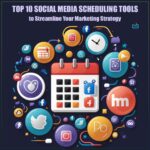Mastering Digital Marketing: 6 Essential Tips for Success
In today’s digital age, effective digital marketing is vital for businesses to thrive and reach their target audience. Whether you’re just starting or looking to refine your online strategy, here are six essential tips to set you on the path to digital marketing success.

1. Define Your Goals and Target Audience:
Before diving into digital marketing, it’s crucial to define clear objectives and identify your target audience. What are you trying to achieve with your digital marketing efforts? Are you looking to increase brand awareness, boost website traffic, generate leads, or drive sales? Understanding your goals will guide your strategies and help you measure success.
Additionally, knowing your target audience is essential. Create detailed buyer personas to understand your ideal customers’ demographics, preferences, pain points, and online behavior. Tailor your digital marketing efforts to resonate with this audience effectively.
2. Do Your Research:
Digital marketing is dynamic, with trends and technologies constantly evolving. Staying informed about the latest industry trends, competitor strategies, and emerging tools is crucial. Invest time in research to understand your industry’s landscape and identify opportunities and gaps.
Conduct keyword research to uncover relevant search terms for SEO and PPC campaigns. Explore your competitors’ digital presence to gain insights into what works and what doesn’t. Continuous learning and adaptability are key to staying competitive in the digital marketing arena.
3. Create a Digital Marketing Plan:
A well-structured digital marketing plan acts as a roadmap for your online activities. Outline your strategies, channels, and tactics in a cohesive plan. It should include a content calendar, social media posting schedule, and a budget allocation for paid advertising.
Consider a multi-channel approach that incorporates various platforms such as social media, email marketing, content marketing, and pay-per-click (PPC) advertising. Each channel should align with your goals and target audience.
4. Don’t Forget About SEO:
Search Engine Optimization (SEO) is the foundation of a successful digital marketing strategy. Optimize your website and content to rank higher on search engine results pages (SERPs). Implement on-page SEO practices like keyword optimization, meta tags, and high-quality content creation.
Off-page SEO, such as building high-quality backlinks and maintaining a strong online reputation, is equally important. Regularly monitor your website’s performance using tools like Google Analytics and Google Search Console to track your SEO progress.
5. Start a Digital Marketing Blog:
Blogging is a powerful tool for engaging your audience and establishing authority in your industry. Create and maintain a blog on your website where you can share valuable, relevant, and informative content. Address topics that resonate with your target audience and answer their questions.
Consistency is key when blogging. Develop a content calendar and stick to a regular posting schedule. Encourage audience interaction through comments and social sharing. Over time, your blog can become a valuable resource and a source of organic traffic.
6. Learn Digital Marketing Skills:
The digital marketing landscape is vast, encompassing various disciplines such as social media marketing, email marketing, content marketing, and PPC advertising. Invest in continuous learning to enhance your skills and stay updated with industry changes.
Consider enrolling in online courses, attending webinars, or joining digital marketing communities and forums. Hands-on experience and experimentation are equally valuable for gaining practical insights into digital marketing techniques.
Related Articles
In conclusion
Digital marketing success requires careful planning, research, and continuous learning. By defining your goals, understanding your audience, and implementing a well-rounded digital marketing strategy, you can position your business for growth and achievement in the digital realm. Stay agile and adaptable to navigate the ever-evolving digital landscape effectively.




